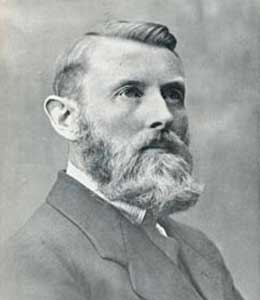
The aim of this website is to draw attention to the thinking and theories of Dr. Helgi Pjeturss, as he put them forward in his book Nýall and subsequent volumes. On the title page of volume II of the series, Ennýall, are the words: “An Icelandic attempt to understand the world and life.” Our task is to open a way to understand the meaning of those words, by bringing together Helgi Pjeturss’ arguments and theories in one place. His essays can be read here for the first time in English, thus opening these remarkable writings to an international readership.
The ideas and theories of Dr. Helgi Pjeturss did not meet with much support when he published them in the early 20th century. They were deemed far-fetched, and inconsistent with what was known about the natural sciences (or thought to be known) at the time.
Astrobiology was at that time uncharted territory, and the same may be said of his dream theories, which were in stark contradiction to the dominant theories of the time. His theories on the nature of telepathy were, by the same token, regarded as far-fetched and unbelievable, and his ideas about bioradiation and telepathic connections between planets were dismissed as quite fantastical.
Throughout his career in science Dr. Helgi Pjeturss strove to explain strange or complex phenomena in terms of natural science. And it appears that his cosmology was firmly based in reality, for ideas which have been evolving in recent decades in such disciplines as ecology, astronomy and quantum physics show a remarkable affinity with the principles expounded by Helgi Pjeturss nearly 100 years ago. Astrobiology, for instance, is now a recognised branch of science (see NASA website): old notions about the formation of solar systems have vanished, and scientists now believe that the creation of solar systems is the general rule, and not an exception as was thought in the past (Sir James Jeans and others). Now the quest to find new solar systems is in full swing, and the possibility of life (intelligent or primitive) existing on other planets is discussed within the scientific community. In this context it is worth mentioning a conference of astronomers held in Toledo, Spain in 1996, at which it transpired that it is no longer a question of if, but when, life will be found on other planets. Mike Kaplan, director of NASA’s Origins Programme, said: “For the first time, it’s not a dream, it’s just a question of time.”
Scientific views on telepathic connections are much changed since Helgi Pjeturss’ time. In recent years respected scientists have been suggesting that there may be a bond between all life in the universe, and that a connection may exist in real time (simultaneously) between organisms, regardless of where they are in the universe.
In view of the above, it is most interesting to read Dr. Helgi Pjeturss’ theories, in light of the scientific advances which have taken place since his day.
Helgi Pjeturss (1872-1949) was born and raised in Reykjavík. He graduated from high school in 1891, and in 1897 he completed the degree of Magister in Natural Sciences and Geography, majoring in Geology, from the University of Copenhagen.
Throughout his academic career Helgi Pjeturss was an outstanding student. After graduation he took part in an expedition to Greenland, where he focussed on ancient shorelines and marine formations from the end of the Pleistocene epoch. He thus developed his skill in applying his keen intelligence and questioning accepted theories and doctrines, which would typify his scientific work throughout his life.
In the summer of 1899 Helgi Pjeturss commenced similar research in Iceland, which led to his most important geological discovery: that there had been more than one period of glaciation, and that Iceland had been formed during repeated stages of glaciation and warming. He put forward his findings in 1905 in Om Islands Geologi (On the Geology of Iceland), for which he was awarded a doctorate from the University of Copenhagen in December that year.
Helgi Pjeturss was now a doctor of geology, the first Icelander to hold that title. He enjoyed solid respect both in Iceland and abroad: he was elected an honorary member of the Icelandic Natural History Society and of the Dansk Geologisk Forening (Geological Society of Denmark).
In the early 20th century Helgi Pjeturss began to study the nature of sleep and dreams, which led him to develop theories on the unity of all life and matter in the universe. He saw cosmology as his most important work, and until the end of his life he focussed all his intellect and energies upon solving that great enigma.